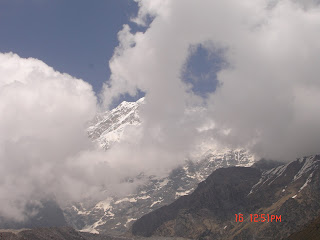Nandadevi at dusk
Destruction, loss, and pain is not unequal, be it anywhere
life exists. It is a perverted and bizarre contention that loss of life and
agony is insignificant and matter of trivia when it is borne by others, by
people of other denominations, faith or race and is the cruelest extent to
which human beings can pursue their ideas. The cataclysm in the Himalayas, the
devastation of the tsunami or even the directly man made afflictions like
genocides and ethnic cleansing we see and hear about are all matters of distress
to people who cannot see the difference in the colour of blood and value of
life.
I was trying to put myself in the picture of the devastation
in the monsoon torrents brought about in the Himalayas. It hurts! It hurts not
because of the loss of life, but because the devastation was asked for- we
crossed the threshold Nature has been putting backward.
The Gods, I’m certain, would see the picture of Kedarnath in
the aftermath of the deluge in the mountains with stoicism. And so should man,
with dispassion. The gods were not wrathful nor did they vent their fury
through pelting and deluge, for they may have vanished from Kedar long ago with
indifference. Looking at the pictures of the ploughed under township of Kedar
and the half inundated entombed temple structure, I wondered why was not the
town totally submerged down under the rocks, mud and debris? To vanish from the
surface like the grandeur of the Mayans or a Pompey! To perhaps be later
discovered and to resurface in an age were man has respect and reverence to the
fragile blue planet that is his only home like the rebirth of Machupichu.
It was commerce in the hills, in the mountains. There was no
sanctity and calm in the frenzied gathering of mortals in what they call as the
abode of Gods. The beeline they made to Kedar, by foot and on miserable mules
was in a state of divorce from the God they ventured to seek in the mountains.
Eyes wide shut and chanting gibberish invocations they were actually defiling
Nature. Remember the Lord of Kedar is a yogi, a hermit and a person who resides
in the pristine air of the mountains.
The obscene concrete structures that were put up on the
mountains jack sawing trees and vegetation were not only an eye sore but brutal
violation of Nature. I wonder if any of the four destinations Yamunotri,
Gangotri, Kedarnath and Badarinath was equipped with means to dispose tonnes of
waste and garbage men threw around with impunity. For many the wailing of
Nature is not even a distant whimper.
The rape of Kedar can be seen and understood only by people
who go there with their “eyes wide open”. For a supplicant, a petitioner
or even a sinner eager to wash away his sins so that he could start all over
again and mortals who are anxious of ensuring a star plus afterlife which they
expect to ensure from the excursion to Kedar and the mountain shrines, her
enchanting self is not noticed. They do not notice the beauty she radiates in
the majesty of the snow clad mountains shinning in the noon sun or the crimson
ornamental appearance at dusk; the cold gushing water of the rivers; the timid
birds that are special to the Himalayas; the silver streaks of waterfalls from
distant hills; the lush green flora; besides all that , the music of silence
that whiff by if one care to listen, be it day or night and the caress of the
cold breeze and the howl of the icy wind at night.
This catastrophe that visited the thousands who went there
believing they can buy salvation is not an exception or a misfortune that
happened like an uninvited tsunami or a volcanic eruption without forewarning.
Similar disasters will be visiting us in other places the Sabarimala for
instance or any place where we defile nature and desecrate her.
Closing these parts of the Himalayas for religious
excursions or restricting the permissible numbers a year with absolute and
impeccable management of the environment must be put forward as possible
solutions. Or perhaps we will never learn, understand and take not notice of the
foreboding. Such is our arrogance, lust for possessions and selfishness .And in our frenzied mode for salvation we might forget to live the life here and
also leave the world an inhospitable place for posterity.




















